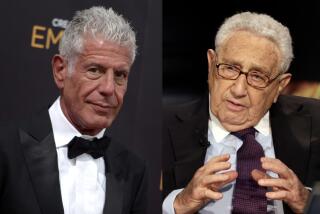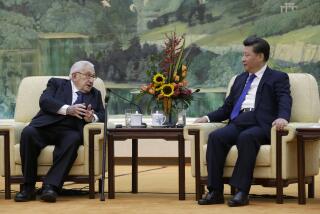U.S.-China Relations
- Share via
Henry Kissinger believes, according to the headline on his July 23 Opinion piece, that “China, America Need Time-Out to Cool Off.” But it was Beijing, not Washington, that provoked the present crisis by its overblown response to Taiwan President Lee Teng-hui’s recent private visit to the U.S., recalling its ambassador for consultations and arresting human rights activist Harry Wu on bogus charges of espionage.
China’s increasing swagger on the international stage is a consequence of its burgeoning economy and rapidly growing military might. While we all applaud economic development, for the People’s Republic of China to achieve superpower status while remaining a one-party dictatorship would be a disaster. It is important that significant political liberalization begin to occur in that country in the not-so-distant future.
In order to speed China’s democratization, we should establish Radio Free Asia, continue to pressure Beijing on human rights and, most importantly, work to raise Taiwan’s status in the world by supporting its participation in international bodies such as the United Nations. Kissinger’s policy of appeasement is no policy at all.
STEVEN W. MOSHER
Director, Asian Studies
Claremont Institute
More to Read
Sign up for Essential California
The most important California stories and recommendations in your inbox every morning.
You may occasionally receive promotional content from the Los Angeles Times.













